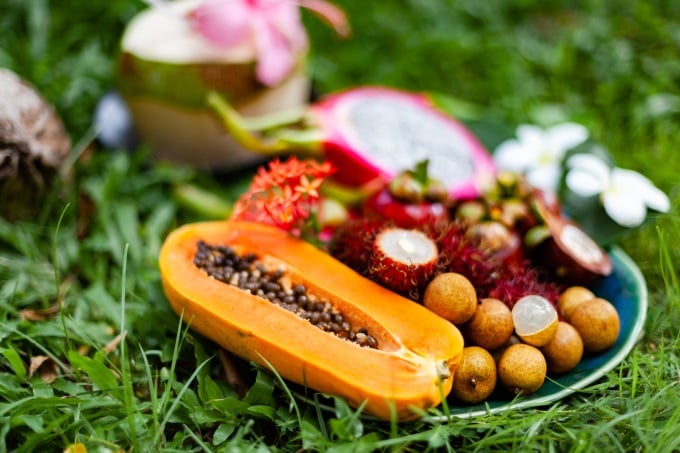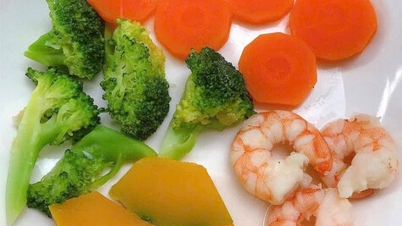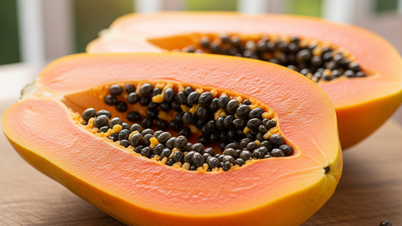Fruits with the highest sugar content include mango, lychee, grapes, pomegranate, cherry... while avocado, guava, cantaloupe, papaya have less sugar.
Along with vegetables, fruits are an essential part of a healthy diet. Fruits are good for you because they contain fiber and other nutrients your body needs. Fruits also contain natural sugars, some of which have more than others.
Fruits contain a lot of sugar
Mango: One mango has 46 grams of sugar. This is not a healthy choice for people who are trying to watch their weight or sugar intake. If this is your favorite fruit, you can enjoy a small piece and divide it into different meals throughout the day.
Lychee: This tropical fruit is loaded with sugar. One cup of lychee juice typically has 29 grams of sugar. Lychees also provide you with about 136 mg of calcium, which is almost double the recommended daily intake of 75 mg.
Grape: A typical cup of grapes contains about 23 grams of sugar. Grapes are a light fruit that can be eaten in large quantities at once, so if you need to cut down on sugar, eat them more slowly or cut them in half, refrigerate them, and enjoy a small amount at each serving.
Cherries : One cup of cherries contains about 18 grams of natural sugar. They are also easy to eat and can be eaten in large quantities. Stick to a portion size to avoid overeating.
Pomegranate : One pomegranate contains about 38.6g of sugar. A better alternative is to drink half a cup of pomegranate seed juice, which contains only 11.9g of sugar. A 2020 review on PubMed from the US National Center for Biotechnology Information (NCBI) indicates that pomegranates may have beneficial effects on blood pressure and also have antioxidant and antibacterial properties.

Each type of fruit usually contains a certain amount of sugar. Photo: Freepik
Low sugar fruits
Avocado: Avocados only contain about 1.33g of sugar. This fruit is often used in dishes such as salads, or as a sauce to eat with toast... Although it contains little sugar, this fruit contains a lot of calories, so it should not be considered a daily habit.
Guava: Each guava has about 5g of sugar and 3g of fiber - more than you get from a serving of brown rice or a slice of whole wheat bread. A guava smoothie with the skin on provides even more fiber.
Raspberries : Raspberries are high in fiber, with 8 grams per cup, and contain only about 5 grams of sugar. Fiber is good for digestion and can help you feel full on fewer calories.
Cantaloupe: This sweet fruit contains only about 5g of sugar and 23 kcal, making it a great addition to your daily diet.
Notes when eating fruit
Sugar may fall within nutritional recommendations to cut back or consume in moderation. However, it is important to note that the body metabolizes the sugar in fruit differently than processed sugar or sugar found in packaged products.
In general, fruits tend to contain less sugar than sweet foods. Fruits contain two types of sugar: fructose and glucose. While the ratios vary, most fruits are about half glucose and half fructose. Glucose raises blood sugar, so the body must use insulin to metabolize it. Fructose does not raise blood sugar.
Everyone, including people with diabetes, can benefit from eating more fruit. This is due to the combination of vitamins and minerals, fiber, phytochemicals, and water that fruit provides. Talk to your doctor or dietitian before making any significant changes to your diet.
Bao Bao (According to WebMD, Medical News Today )
Source link





![[Photo] Binh Trieu 1 Bridge has been completed, raised by 1.1m, and will open to traffic at the end of November.](https://vphoto.vietnam.vn/thumb/1200x675/vietnam/resource/IMAGE/2025/10/2/a6549e2a3b5848a1ba76a1ded6141fae)













![[Video] Ministry of Health issues document to rectify medical examination and treatment work](https://vphoto.vietnam.vn/thumb/402x226/vietnam/resource/IMAGE/2025/10/2/54913f30a9934e18bcbb246c2c85f11d)




















































































Comment (0)